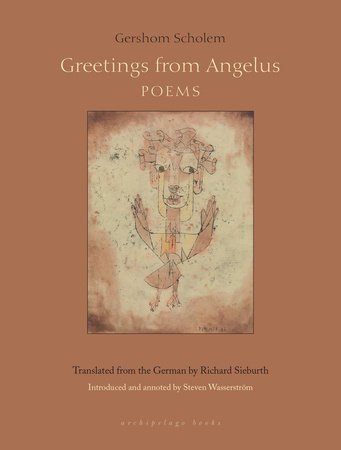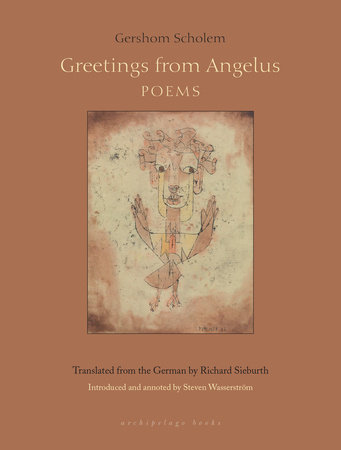

Greetings From Angelus
By Gershom Scholem
Introduction by Steven Wasserstrom
Translated by Richard Sieburth
By Gershom Scholem
Introduction by Steven Wasserstrom
Translated by Richard Sieburth
By Gershom Scholem
Introduction by Steven Wasserstrom
Translated by Richard Sieburth
By Gershom Scholem
Introduction by Steven Wasserstrom
Translated by Richard Sieburth

-
$16.00
Feb 27, 2018 | ISBN 9780914671978
-
Jan 30, 2018 | ISBN 9780914671985
YOU MAY ALSO LIKE

Letters

Party, Army and Masses in China

The Experience Machine

The Lumumba Plot

The Name of This Band Is R.E.M.

Richard Hart Bread

Very Good Bread

Guerrilla Warfare

Every Family Has a Story
Praise
“Gershom Scholem’s scholarship was of [the] rare, life-giving kind. Not only have his studies of the Kabbalah altered . . . the image of Judaism–but his explorations, translations, and presentations of Kabbalistic writings exercise a formidable influence on literary theory at large, on the ways in which non-Jewish and wholly agnostic critics and scholars read poetry.” — George Steiner, New Yorker
“Gershom Scholem’s achievement has already put a generation of readers in his debt. He has intrepidly, singlehandedly, almost monomaniacally pursued the task of saving the literature of Jewish mysticism . . . restoring it to an estate of respect, honor, and importance.” — Arthur A. Cohen, New York Times Book Review
“We see a great analytical mind at work . . . Richard Sieburth’s deep understanding of Scholem’s thought, and his masterful re-creation of Scholem’s rhythms and rhymes, reflect the inner workings of these original German poems. Sieburth’s translations offer a fascinating insight into the thoughts and literary sensibility of one of the great minds of the twentieth century.” — Peter Constantine, World Literature Today
“”…Scholem’s most private writing… The poems collected in Greetings from Angelus were never intended to be published; at most they were written for an audience of one. Often this was Walter Benjamin…[I]n this crucial period of Scholem’s intellectual development, Benjamin was a key stimulus to his thinking about language, myth, and Judaism… [T]he most serious poems Scholem wrote concerned his spiritual disappointment in Zion.” — Adam Kirsch, New York Review of Books
“The Fullness of Time offers an aspect of Scholem’s own communing with the spirit of language that will be new even to those quite familiar with his works in philology and history of religion…the verses collected here were acts of private devotion.” — Erica X Eisen, Threepenny Review
“Abrupt, magisterial, quizzical, sometimes acidulous, and at moments poignantly wistful…. Scholem’s verses return to an authentic Hasidic tradition of indicting God.” — Harold Bloom
“An excellent bilingual selection. Richard Sieburth’s versions are lucid, sensitive, forceful, and always attentive to the originals. Steven Wasserstrom’s incisive commentary provides the ideal context…. Given the complexities that it resolves-historical, biographical, theological, literary-this edition is a model of its kind.” — Jeremy Adler, The Times Literary Supplement
“Gershom Scholem wrestled with the great questions of his time: the fate of utopian dreams in the pincers of 20th century history and the lingering, transcendent value of friendship. Richard Sieburth’s luminous translations capture Scholem’s voice as he dances back and forth across the border line between punditry and prophecy, while always projection sheer passion for the Word.” — George Prochnik
“Scholem has rare gifts for synthesis and generalization, as several of his more recent essays on Jewish messianism and tradition demonstrate, but his mind is equally remarkable for the way it adheres to the smallest particles of particular historical experience” – Robert Alter
“Gershom Scholem is first and foremost a poet of friendship: you can read this book as a loving, if at times jousting, life-long conversation with Walter Benjamin on topics ranging from Zion to Kafka to Klee. This makes the book a valuable historical document as much as a moving life-sequence of poems. Richard Sieburth’s superb translation not only ferries over the meanings of the originals, but revitalizes them, causing Scholem’s fairly traditional German rhymed verse to positively sparkle in English.” — Pierre Joris
“Richard Sieburth has performed a magnificent service . . . he has found a contemporary equivalent for Scève’s extremely compact music and enabled it to breathe in English, while still retaining the tension of the original.” — John Ashbery (on Maurice Scève’s Emblems of Desire)
“Like a jewelry chest, the covers of this book open on a gem of German prose, brought to its full radiance by Richard Sieburth’s splendid translation.” — William H. Gass (on Georg Büchner’s Lenz)
21 Books You’ve Been Meaning to Read
Just for joining you’ll get personalized recommendations on your dashboard daily and features only for members.
Find Out More Join Now Sign In










